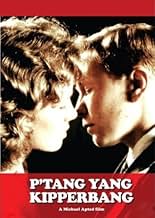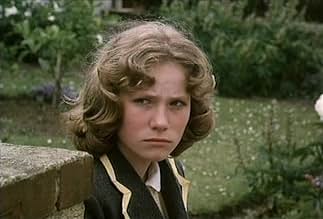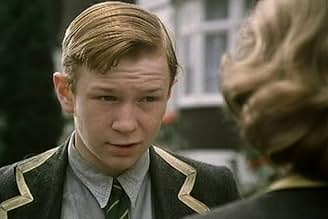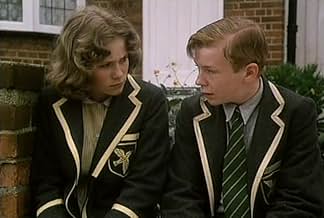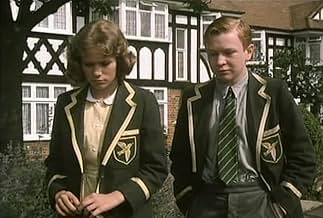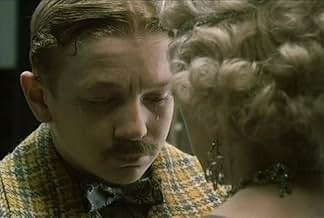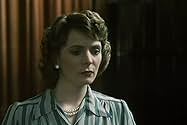VALUTAZIONE IMDb
7,1/10
1117
LA TUA VALUTAZIONE
Aggiungi una trama nella tua linguaIn 1948, a socially awkward cricket-obsessed London schoolboy wants to kiss a classmate, his co-star in a play.In 1948, a socially awkward cricket-obsessed London schoolboy wants to kiss a classmate, his co-star in a play.In 1948, a socially awkward cricket-obsessed London schoolboy wants to kiss a classmate, his co-star in a play.
- Nominato ai 3 BAFTA Award
- 3 candidature totali
Christopher Karallis
- Shaz
- (as Chris Karallis)
Recensioni in evidenza
An enjoyable movie, without a doubt, and very evocative of both its era and that very particular stage in any boy's 'rites of passage'. But I have to say that having read the very positive comments here, I was a bit disappointed. The period was captured, but the plot was desperately thin. The whole thing revolves around the most egregious bit of miscasting in the history of school plays. The idea that quack quack would ever be chosen to play not only one of only three star turns, but a philanderer, is risible. And without that, nada. The sub-plots bore no relation that I could see to the main plot - all of them could be removed in their entirety without in any way affecting the main story - which surely suggests a fundamental flaw. When all your sub-plots look like padding, you know a central idea is being stretched beyond its limits. Nevertheless, it's a benign movie with its heart in the right place, there are some fine performances, and you just get the feeling that everyone involved felt deflated at the final 'cut!' That good feeling permeates the film. And that has to count for something. A flawed really quite good movie. 7 out of 10.
Postwar England, the dawn of the "atomic age". Yet, the worries of a young schoolboy yearning to experience his first "kiss" cannot be derailed by something as inconsequential as THE BOMB. This was a delightful if not educational look at young love from the vantage point of an adolescent male and his world of the
1940's. Free of political correctness and preachy messages, this film exposes the viewer to the world that only the mind (and
hormones) of a young teenager can create. Wonderful subplots
maintain character interest ala "Gregory's Girl", and plenty
of well blocked shots help keep up the imagery of this era. This is a very good story for anyone, young or old, who has
ever been in love, or ever wanted to be. Does he ever get his wish? Watch it and see.
1940's. Free of political correctness and preachy messages, this film exposes the viewer to the world that only the mind (and
hormones) of a young teenager can create. Wonderful subplots
maintain character interest ala "Gregory's Girl", and plenty
of well blocked shots help keep up the imagery of this era. This is a very good story for anyone, young or old, who has
ever been in love, or ever wanted to be. Does he ever get his wish? Watch it and see.
Through their collaborations on TV in the 1960s and 1970s, writer Jack Rosenthal and director Michael Apted had crafted a number of popular and acute studies of human character through plays, sitcoms and even episodes of Coronation Street. Little wonder then that by the 1980s when the new fourth British television channel was being planned, that these two talents should be earmarked for the first project of its film wing.
Rosenthal returns to the landscape of his own youth for this story, a middle-class British school of the 1940s. In simple terms, it is the story of a fourteen-year-old boy, Alan Duckworth, and his two great loves: a very public passion for cricket and a more private, unrequited adoration of one of his female classmates, Ann Lawton. In the transitional stage between childhood and adulthood, he is able to maintain a friendship with the school groundsman, Tommy, and discuss intelligent topics with him, yet is still something of an unruly pupil, larking about with his 'gang' friends at inappropriate moments. It is the club greeting of this gang, an obligatory exchange of the password "P'Tang, Yang, Kipperbang - uhh!" that gives this film its title, one to rank among the most bizarre in the history of cinema along with Laughing Gravy (1930) and The Film That Rises To The Surface Of Clarified Butter (1968).
Duckworth's growing infatuation with Ann seems doomed to progress no further than longing gazes across the classroom until an unexpected turn of events propels him along a course whereupon it seems inevitable that he must declare his feelings to her. However, as this is a course of action he is now being pressured into, he begins to wonder if asking God to bring him this opportunity was such a good idea after all.
But this is a Jack Rosenthal script, so although this tale of adolescence is told in a quite charming way, there is so much more going on in the film and it explores love and sex as driving forces for most of the other characters in the film also, and how it differs for each. Tommy, recently back from serving overseas during the war, is now working the land at the school and has also been 'working' Miss Land, Alan's teacher. Miss Land, rather prim and proper in class, has quite an appetite for men, and when all the young eligible ones were away fighting it is revealed that she took on older men for lovers rather than remain celibate. The boys in Alan's class have reached an age where they want sex but haven't achieved it, and thus even a claim to have groped a girl's chest over her clothes affords a boy some superior status over his peers. But even the girls seem rather obsessed too, having a poll to see which is the most desirable boy in the class. The juxtaposition of these events help to illustrate that Alan is truly motivated more by love than mere lust. And just as they also demonstrate a depth to Alan, the events also show this unexpected depth of Alan's character to Ann Lawton, who had never previously given him a second thought.
There's a top-notch cast at work here, many of them just starting out on what have turned out to be successful screen careers. Watch out for one-time Eurovision entrant Frances Ruffelle as the girl who offers out hugs for all the boys in the class.
The film is not full of action or incident and although it explores some adult themes, it is subtle rather than explicit. As a snapshot of British life just after the war, I am not sure how much this will appeal to audiences of different ages or from different cultures but as its themes are so fundamentally human, the underlying story should surely be appreciated universally. And in its approach to exploring those themes, the film is practically faultless.
Rosenthal returns to the landscape of his own youth for this story, a middle-class British school of the 1940s. In simple terms, it is the story of a fourteen-year-old boy, Alan Duckworth, and his two great loves: a very public passion for cricket and a more private, unrequited adoration of one of his female classmates, Ann Lawton. In the transitional stage between childhood and adulthood, he is able to maintain a friendship with the school groundsman, Tommy, and discuss intelligent topics with him, yet is still something of an unruly pupil, larking about with his 'gang' friends at inappropriate moments. It is the club greeting of this gang, an obligatory exchange of the password "P'Tang, Yang, Kipperbang - uhh!" that gives this film its title, one to rank among the most bizarre in the history of cinema along with Laughing Gravy (1930) and The Film That Rises To The Surface Of Clarified Butter (1968).
Duckworth's growing infatuation with Ann seems doomed to progress no further than longing gazes across the classroom until an unexpected turn of events propels him along a course whereupon it seems inevitable that he must declare his feelings to her. However, as this is a course of action he is now being pressured into, he begins to wonder if asking God to bring him this opportunity was such a good idea after all.
But this is a Jack Rosenthal script, so although this tale of adolescence is told in a quite charming way, there is so much more going on in the film and it explores love and sex as driving forces for most of the other characters in the film also, and how it differs for each. Tommy, recently back from serving overseas during the war, is now working the land at the school and has also been 'working' Miss Land, Alan's teacher. Miss Land, rather prim and proper in class, has quite an appetite for men, and when all the young eligible ones were away fighting it is revealed that she took on older men for lovers rather than remain celibate. The boys in Alan's class have reached an age where they want sex but haven't achieved it, and thus even a claim to have groped a girl's chest over her clothes affords a boy some superior status over his peers. But even the girls seem rather obsessed too, having a poll to see which is the most desirable boy in the class. The juxtaposition of these events help to illustrate that Alan is truly motivated more by love than mere lust. And just as they also demonstrate a depth to Alan, the events also show this unexpected depth of Alan's character to Ann Lawton, who had never previously given him a second thought.
There's a top-notch cast at work here, many of them just starting out on what have turned out to be successful screen careers. Watch out for one-time Eurovision entrant Frances Ruffelle as the girl who offers out hugs for all the boys in the class.
The film is not full of action or incident and although it explores some adult themes, it is subtle rather than explicit. As a snapshot of British life just after the war, I am not sure how much this will appeal to audiences of different ages or from different cultures but as its themes are so fundamentally human, the underlying story should surely be appreciated universally. And in its approach to exploring those themes, the film is practically faultless.
10moamen27
Although i don't like cricket at all and i have seen this movie 13 years ago, I still think it is one of the best coming-of-age movies ..i remember the day i returned home from my school and sat down to have my lunch, I saw the opening titles of that movie and then....i was so immersed in it that i felt i was there, it really affected me personally. i still remember how i felt when i first saw it ,i felt that the poor boy was a friend of mine, going through the same adolescent experience we were having in those days. what i really liked about that movie is the main theme of a "shy" boy fantasizing about "kissing" his dream girl, no offense but if that was an American movie, you would certainly see-at a certain point, mainly climax- the "shy" boy "making love" to his girl, and i really can't grasp this contradicting concepts till now...i have a simple request ,if anyone knows how to get this movie on a DVD by mail ,please let me know cause i need a shot of memories..Thanks
Not as "simple" as the plot synopsis makes out. The lad struggles with issues such as his hopes that after the second world war there will be progress for everyone and that there will be no more wars in the future. It is a sad awakening he has to the reality of lies and deceit. Lies from the person he admires and what we the audience see as the hypocrisy of his form teacher who while preaching moral decency to the class, behaves very differently herself (i am not condemning her it is actually the hypocrisy of the times astutely observed by Jack Rosenthal the author). Still, these are deep waters among the shallows of a "simple" boy girl plot. Oh, and I have't mentioned the cricket commentary that runs through the lads mind at crucial times. If you love any ball game e.g. Baseball, you will so get it- so US do give it a go. You could well love it! Cricket lovers- well it goes without saying.
Lo sapevi?
- QuizOne of the very first Film4 productions, an offshoot of the UK's then new Channel 4 which essentially revolutionized the British film industry by making a series of relatively cheap films which would air on the TV channel several months after their cinema release. This new style of production brought such resounding successes as Paris, Texas (1984), Lettera a Breznev (1985), My Beautiful Laundrette - Lavanderia a gettone (1985), Quattro matrimoni e un funerale (1994), East Is East (1999) and 12 anni schiavo (2013).
- BlooperWhen Alan, Ann and Geoffrey walk home from school after rehearsing for the school play, the top deck of a modern (probably late 1970s) double-decker bus is visible at the far end of the alley. In the same scene, opposite the side-road that leads to the alley, is a modern Warboys-design (post-1964) "no cycling" sign.
- ConnessioniFeatured in Timeshift: Jack Rosenthal: The Voice of Television Drama (2004)
I più visti
Accedi per valutare e creare un elenco di titoli salvati per ottenere consigli personalizzati
Dettagli
- Data di uscita
- Paese di origine
- Lingua
- Celebre anche come
- First Love: P'tang, Yang, Kipperbang
- Luoghi delle riprese
- Aziende produttrici
- Vedi altri crediti dell’azienda su IMDbPro
Contribuisci a questa pagina
Suggerisci una modifica o aggiungi i contenuti mancanti

Divario superiore
What is the Spanish language plot outline for P'tang, Yang, Kipperbang (1982)?
Rispondi
